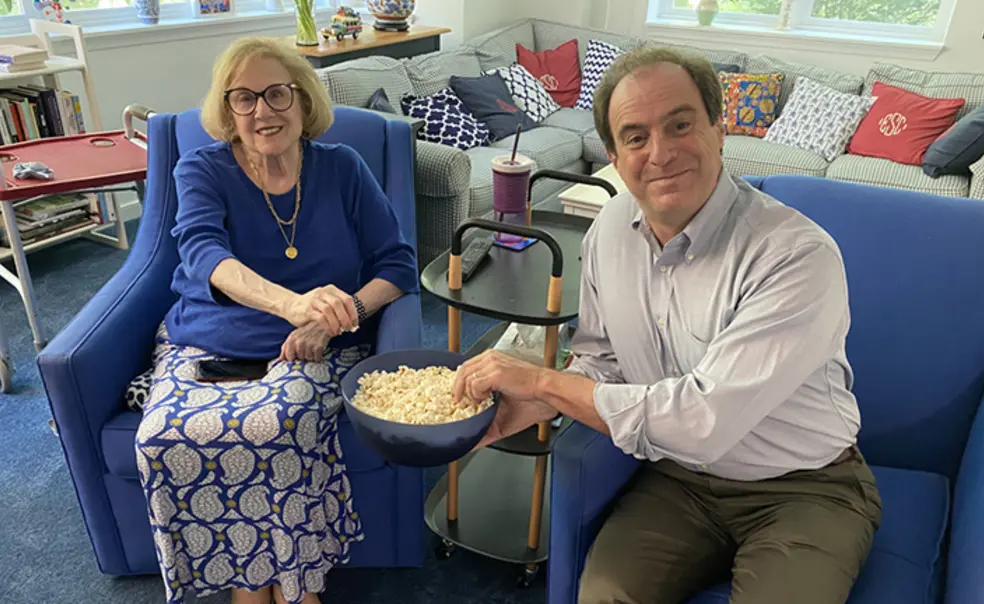PAW Goes to the Movies: Elaine Showalter Watches ‘The Chair’
‘Nobody wants to fight to be the chair,’ Showalter says
After an extended absence, PAW Goes to the Movies returns, though in a slightly different form in the age of COVID: With many movie theaters still closed or operating at reduced capacity, we turned to streaming video.
The popular Netflix series The Chair follows Professor Ji-Yoon Kim (played by Sandra Oh) as she becomes the first woman to chair the English department at fictional Pembroke University (“one of the lesser Ivies” in the words of actor David Duchovny ’82, who has a cameo appearance playing himself). Across six episodes, Professor Kim tries to juggle departmental politics, declining enrollment, a politically volatile campus, and her role as the mother of an adopted child.
Who better to review the show than Elaine Showalter, who taught at Princeton from 1984 to 2003 and was the first woman to chair the English department? Showalter, now retired and living in Washington, D.C., watched the series’ final episode with PAW senior writer Mark F. Bernstein ’83 and then discussed a dramatized academic world that is very different from the one she knew, yet strangely familiar.
What did you think of the show?
I loved the idea of having a woman chair and having her be a woman of color. Sandra Oh gave a terrific performance. The whole cast did.
The show was conceived by a screenwriter with a Ph.D. in English and financed by the two guys who produced [the hit HBO series] Game of Thrones, and when I watched the show, it seemed like it could have been titled Game of Chairs. But unlike Game of Thrones, nobody wants to fight to be the chair. It’s a middle-management job. You have no real power, although you’re perceived as having a lot of power, and it’s stressful, even for the best people.
What makes a good chair?
The people I have admired as department chairs were open to new ideas. You’re there to support the people in the department, and people do that in many different ways.
In my experience, and I think this was represented in the show, being departmental chair is akin to parenting. Many people experience a department as a kind of family, and they are used to seeing the male chair as a father figure. Now, a father figure attracts a lot of anger but also respect. A woman in that role is different. The mother figure is a love-hate figure for both sons and daughters whether in mythology or Freudian psychology. Ji-Yoon always has the support of all the women in the department. In reality, you cannot count on that.
As a teacher, what did you think of the show?
The faculty members in the show aren’t exactly caricatures, but they are simplified. For example, the Bill Dobson character [played by Jay Duplass] was sort of a ’60s throwback. I once taught with someone like him, but he’s too wild, too irresponsible to get tenure now. Still, it’s television. The show did not get to be No. 1 on Netflix because English professors were watching it. It had to play to a wide audience.
Some of the classroom scenes, though, really connected. In one of the last scenes, Ji-Yoon reads aloud Emily Dickinson’s poem “Hope is the thing with feathers.” First, she read the poem beautifully, but she also asked her class what that line means. That was exactly the sort of question one might ask a class. A student also mentions Dickinson’s use of hyphens, and Ji-Yoon suggests that they represent something she’s not ready to say. I thought that was a helpful way to open discussion.
During the disciplinary-hearing scene, Ji-Yoon says, “The world is burning and we’re talking about the endowment.” You didn’t like that. Why?
It’s a great line, but it ends the wrong way. The real issue for students is that the world is burning and we’re talking about Emily Dickinson. The world is burning and we’re still saying that it’s important to study novels and poems. There is a tremendous push now against the humanities. Students are under increasing pressure to study something that will get them a job, so how do you respond to that?
How do you respond to that?
Reading great literature, reading in general, is always relevant and meaningful, but you don’t have to be an English major to read, or an English professor to celebrate the joys of literature. But choosing to major in English, in the context of the current attacks on the humanities as impractical, does need to be championed.
I believe an English major in 2021, certainly at Princeton, is exceptionally flexible and capacious, open to a huge variety of individual interests. It prepares students for many traditional professions, such as teaching or law, but also for new careers, including showrunning and speechwriting, which didn’t even exist when I was a department chair. Interview conducted and condensed by M.F.B.
Watch a trailer for The Chair on Netflix:
This story was updated to correct the year when Showalter joined the Princeton faculty.










1 Response
Richard M. Waugaman ’70
4 Years AgoOpen to All New Ideas?
Professor Showalter said, “The people I have admired as department chairs were open to new ideas.”
Would that one day this might include Shakespeare authorship skeptics. At my university, I was warned never to represent myself as a Shakespeare “scholar,” despite my now 100 publications on Shakespeare. One more experience that makes me wonder if the traditional authorship theory is more faith-based than evidence-based.